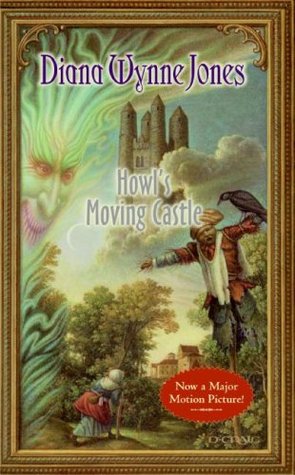Review: 'Howl's Moving Castle' by Diane Wynne Jones
 Every once in a while I see a movie that simply seems to be made to be loved by me. Studio Ghibli's Howl's Moving Castle (2004) was one of those movies and I was ecstatic to find out there was a book. Although the comparison between the two is bound to happen, this is a review of the book.
Every once in a while I see a movie that simply seems to be made to be loved by me. Studio Ghibli's Howl's Moving Castle (2004) was one of those movies and I was ecstatic to find out there was a book. Although the comparison between the two is bound to happen, this is a review of the book.Sophie has the great misfortune of being the eldest of three daughters, destined to fail miserably should she ever leave home to seek her fate. But when she unwittingly attracts the ire of the Witch of the Waste, Sophie finds herself under a horrid spell that transforms her into an old lady. Her only chance at breaking it lies in the ever-moving castle in the hills: the Wizard Howl's castle. To untangle the enchantment, Sophie must handle the heartless Howl, strike a bargain with a fire demon, and meet the Witch of the Waste head-on. Along the way, she discovers that there's far more to Howl—and herself—than first meets the eye.First of all, it is delightful to see a main character like Sophie in a children's book, because that is what Howl's Moving Castle is. For a book targeted at young children, a 90-old woman is an interesting choice to make. Sophie is incredibly independent and yet has a very strong sense of honour. As the oldest, she feels it is her duty to be the one with the boring, respectable life and because of this doesn't see how her own life is quite magical. I feel that in Sophie, there is a message to younger kids that yes, sometimes you have to work for things and your life might not always seems exciting, but there is magic in the littlest things, if you are only willing to see it. Not enough stories, I feel, tell children how much they influence their own life. A lot of Sophie's mistakes are because she is too rash, refuses to admit her own value or notice the small things. However, her victories also come from being able to make quick decisions and sacrificing her own wishes in order to help others.
Opposite the interesting Sophie, there is the enigmatic Howl, a wizard who seems to spend most of his time running away. What I appreciate about his character, besides his beautifully dramatic outbursts, is that he shows that power does not equal strength. Howl spends most of his time creating lies and tricks in order to stay safe and keep those he loves safe. The message behind this is, I feel, that just because you're capable of being powerful doesn't mean you have to use that power. Howl seems to have no idea what is going on, but since the novel is told from Sophie's point of view, it is clear her prejudices towards Howl are getting in the way of her seeing his actual intentions. The idea of magic isn't really explored, understandably considering the target audience, but it isn't shown as something exclusive or something
Wynne Jones writes beautifully. There seems to be no rush to the novel and yet she doesn't unnecessarily linger. Where the English-student in me wishes there were 400 more pages to read, the everlasting child within me was incredibly pleased. Wynne Jones explains where explanation is necessary but lets the characters act for themselves when it is their time. She weaves together her magical world and our world in such a natural way the thought to question it never pops up. Authors writing for children have to find the balance between not making their writing too difficult and not treating their readers as idiots. Sentences as the following show Wynne Jones has more than enough fate in her readers to be able to explore some interesting ideas in her book:
'Howl yelled. "I'm a coward. Only way I can do something this frightening is to tell myself I'm not doing it!"'I feel everyone can, to some extent, relate to that idea and yet it is big thing to have a main, male, character admit to being a coward so openly.
I give this novel...

4 Universes!
It's an amazing children's book which is bound to hold some unexpected lessons. There is some beautiful imagery, an unexpected yet lovely cast of characters and a genuine affection from the writer towards her own creation. I am definitely planning on reading it to my children and I would recommend it to everyone who still enjoyed some mild fantasy.



I simply adore this book. So are you going to read the 2nd book in the series, Castle In The Air?
ReplyDeleteI'm definitely planning to! Although I think that one's not about Sophie and Howl and since I'm currently in love with them I might have to wait for a bit! Thanks for stopping by :)
DeleteI had loved the movie too...didn't know there was a book...
ReplyDeleteNeither did I! It was a beautiful revelation! I definitely recommend it :)
ReplyDeleteCastle in the Air does have Sophie and Howl in it, but they're not the main characters. It's very charming though, I highly recommend it!
ReplyDelete